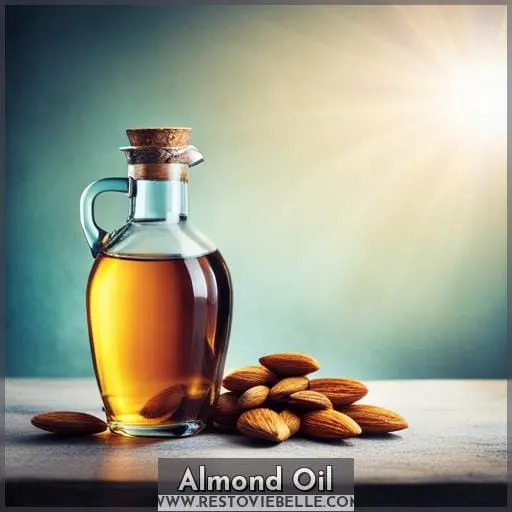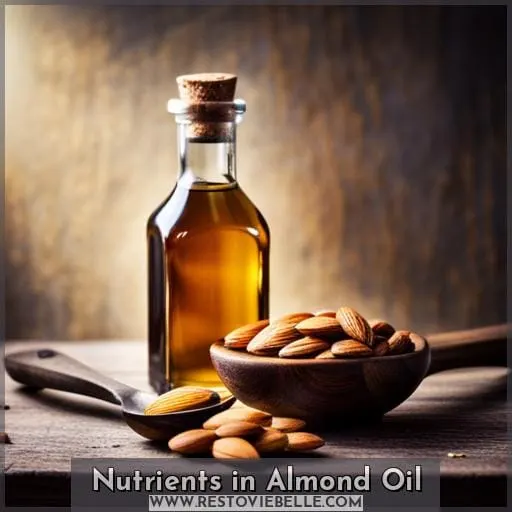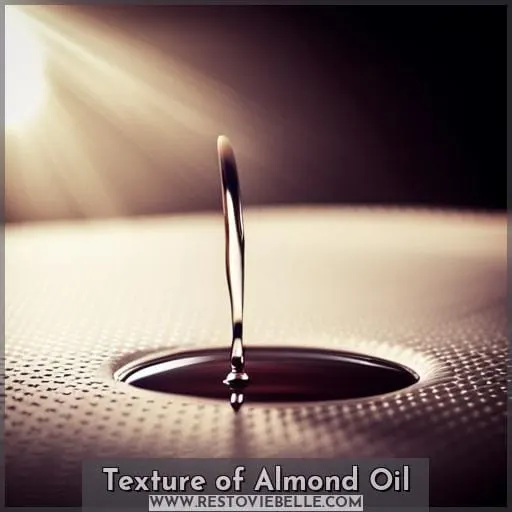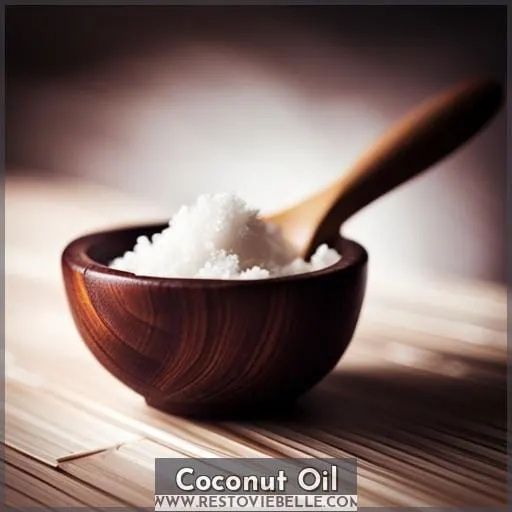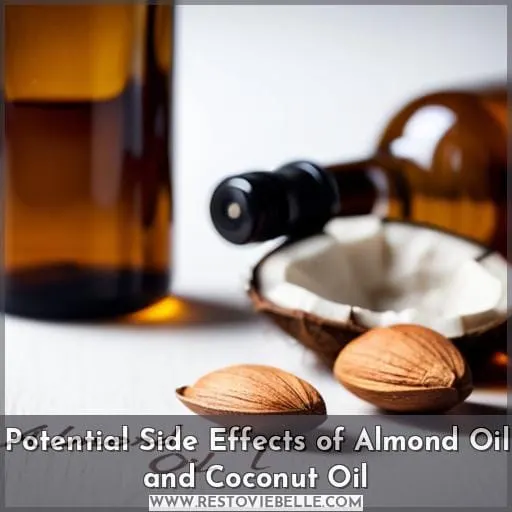This site is supported by our readers. We may earn a commission, at no cost to you, if you purchase through links.
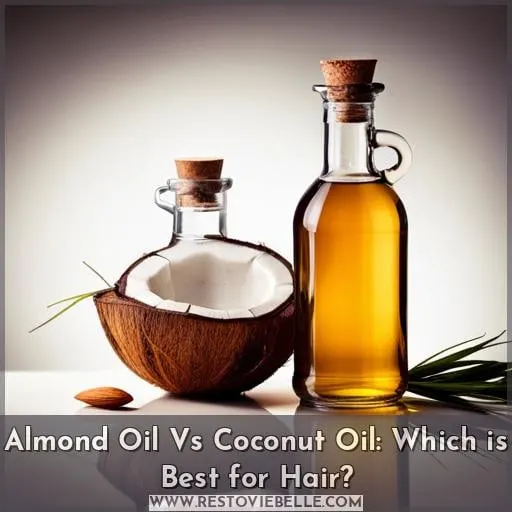 Imagine having luscious, healthy hair that turns heads wherever you go. But with so many options out there, which oil should you choose for your hair: almond oil or coconut oil? Both oils have their own unique benefits and properties that can transform your locks.
Imagine having luscious, healthy hair that turns heads wherever you go. But with so many options out there, which oil should you choose for your hair: almond oil or coconut oil? Both oils have their own unique benefits and properties that can transform your locks.
In this article, we’ll dive into the world of almond oil and coconut oil to help you make an informed decision about which one is best for your hair goals.
Table Of Contents
- Key Takeaways
- Almond Oil
- Nutrients in Almond Oil
- Texture of Almond Oil
- Cost of Almond Oil
- Shelf Life of Almond Oil
- Benefits of Almond Oil for Hair
- Coconut Oil
- Benefits of Coconut Oil for Hair
- How to Use Almond Oil and Coconut Oil for Hair
- Potential Side Effects of Almond Oil and Coconut Oil
- Frequently Asked Questions (FAQs)
- Conclusion
Key Takeaways
- Almond oil is rich in vitamin E and monounsaturated fatty acids, providing hydration, smoothing, strengthening, and dandruff control for all hair types.
- Coconut oil softens, detangles, strengthens, and prevents premature graying of hair.
- Almond oil has a shelf life of 6 months if stored properly.
- Both almond oil and coconut oil have potential side effects such as allergic reactions or scalp irritation.
Almond Oil
Using almond oil for your hair has many benefits.
Almond oil isn’t only beneficial for the skin but also provides excellent nourishment and care to your hair.
It contains essential vitamins and minerals like vitamin E, which promotes healthy hair growth, strengthens the strands, and prevents breakage.
Additionally, almond oil moisturizes the entire strand of hair from root to tip, helping to eliminate dryness and promote a healthier scalp.
When it comes to using almond oil in your diet or as a finishing oil for salads, it offers numerous health benefits as well.
Being a monounsaturated fat rich in antioxidants makes it an ideal choice for raising good cholesterol levels while lowering bad cholesterol.
However convenient this natural remedy may be when used on its own or mixed with other oils such as coconut or olive oils; there are still potential risks associated with sweet almond allergies that need consideration before use.
In conclusion,
almond
oil
provides multiple advantages
for both skin
and
hair.
Its high content of vitamins
and minerals make
it an effective option
to promote strong
hair growth,
moisturize strands,
and improve overall scalp health.
Additionally,
when included in one’s diet,
almond
oil can contribute
to maintaining proper cholesterol levels.
However,
individuals should be cautious
of any potential allergic reactions.
Overall,
using
almnd
oil can bring about positive changes
in both appearance
as well
as overall
well-being.
Remember
to always do
a patch test
before applying almondoil
directly onto
your
skin
or hair.
Nutrients in Almond Oil
Now, let’s delve into the nutrient profile of almond oil and discover how it can benefit your hair.
Almond oil is packed with essential nutrients that promote healthy hair growth and nourishment.
One key nutrient found in almond oil is vitamin E, a powerful antioxidant known for its ability to protect against oxidative stress caused by free radicals. This antioxidant property helps maintain the health of your scalp and hair follicles.
Moreover, almond oil possesses anti-inflammatory properties that can soothe any irritation or inflammation on the scalp, making it an excellent choice for those dealing with dandruff or other scalp conditions.
In addition to these benefits, almond oil contains monounsaturated fatty acids which help moisturize and soften your hair strands from root to tip.
Overall, incorporating almond oil into your regular hair care routine can lead to improved overall hair health due to its abundance of nutrients like vitamin E as well as its antioxidant and anti-inflammatory properties.
Texture of Almond Oil
Almond oil has a thick texture that provides nourishment and hydration to the hair. Its viscosity allows it to coat each strand of hair, sealing in moisture and protecting it from damage. Despite its thickness, almond oil absorbs quickly into the hair without leaving behind any greasy or heavy residue.
This lightweight nature makes almond oil suitable for all hair types, including both dry and oily hair.
The texture of almond oil also contributes to its versatility when it comes to blending with other oils or ingredients. It blends well with essential oils, carrier oils, and natural extracts, allowing you to customize your own DIY treatments for specific needs such as promoting growth or reducing dandruff.
For those with dry hair, almond oil is particularly beneficial due to its ability to deeply moisturize and soften strands. The rich consistency penetrates deeply into the shafts of the hairs providing much-needed hydration.
On the other hand if you have oily scalp then Almond Oil can help regulate sebum production while still providing necessary moisture without weighing down your locks therefore making it great option even for those struggling with excess grease on their roots.
Overall,the thick texture of almond oil lends itself well towards improving various aspects related specifically towards maintaining healthy-looking,hair by ensuring sufficient amount nutrients make way through every single follicle.
Cost of Almond Oil
When shopping for hair care products, you may be considering the cost of almond oil. Almond oil is generally more expensive compared to other oils like coconut oil. The price of almond oil can vary depending on factors such as brand, quality, and quantity.
It’s important to note that pure and organic almond oil tends to be pricier than those that are blended or diluted with other ingredients.
To find the best deal on almond oil, it’s recommended to compare prices from different retailers both online and in physical stores. Many health food stores, specialty beauty shops, and online marketplaces offer a wide selection of almond oils at various price points.
If you’re looking for a more affordable alternative to using pure almond oil for your hair care needs, there are several substitutes available such as sweet apricot kernel or jojoba oils which have similar nourishing properties.
Considering the benefits that come with using almonds in your haircare routine like improved hydration and strengthening effects; despite its higher cost compared to coconut oil alternatives – perhaps it’s worth investing in this luxurious ingredient.
Shelf Life of Almond Oil
To ensure the quality and effectiveness of your almond oil, it’s important to be mindful of its shelf life.
- Refrigerate before opening: Almond oil can be refrigerated to extend its shelf life. Keeping it in a cool environment helps preserve its freshness and prevent oxidation.
- Refrigerate after opening: Once you open a bottle of almond oil, it’s recommended to store it in the refrigerator. This will help maintain its potency and prevent rancidity.
- Shelf life: Unopened bottles of almond oil can typically last up to 6 months if stored properly in a cool, dark place away from direct sunlight or heat sources.
By following these storage guidelines, you can maximize the shelf life of your almond oil and ensure that it remains effective for all your hair care needs.
Benefits of Almond Oil for Hair
When it comes to the benefits of almond oil for hair, there are three key points to consider.
First, almond oil provides hydration and helps in smoothing the hair, leaving it soft and manageable.
Second, it strengthens the hair follicles and promotes growth by nourishing them from within.
Lastly, almond oil is effective in controlling dandruff and maintaining a healthy scalp environment.
Hydration and Smoothing
Achieve hydration and smoothness for your hair by incorporating almond oil into your beauty routine. Almond oil is an excellent choice for moisturizing and nourishing your hair. It absorbs quickly, preventing split ends and reducing frizz, while also protecting the color of your hair.
By using almond oil regularly as a hair mask or adding it to your styling products, you can maintain hydrated and smooth locks while preventing breakage.
Strengthening and Growth
How can almond oil strengthen and promote the growth of your hair?
Almond oil is rich in nutrients like vitamins E and zinc, which nourish and strengthen the hair follicles.
Additionally, almond oil improves the texture of your hair by moisturizing it from root to tip. It also thickens the strands for fuller-looking locks while increasing shine for a lustrous appearance.
Dandruff Control
Get rid of dandruff and enjoy a flake-free scalp by incorporating almond oil into your hair care routine.
Almond oil helps control dandruff due to its moisturizing properties and anti-inflammatory benefits.
To use, apply almond oil directly to the scalp, leave it on for about 30 minutes or overnight, then wash it off with shampoo.
Use this treatment once or twice a week for best results.
Remember to do a patch test before using any new products to check for potential allergic reactions.
Coconut Oil
To continue the comparison between almond oil and coconut oil for hair, let’s explore the benefits of using coconut oil.
Coconut oil offers a range of advantages for both your skin and hair. When it comes to skincare, coconut oil moisturizes and protects the skin while removing dirt and bacteria. For your hair, this versatile oil tames fly-away strands, making them thicker and heavier to prevent frizz.
Additionally, coconut oil slows down hair loss while promoting new growth. It also helps slow down the aging process of your locks.
When considering which one to use between almond oil and coconut oi,l it’s important to note that both oils have similar properties but differ in some aspects such as comedogenic rating – making almond better suited for oily skin types than coconut.
In terms of shelf life, sweet almond is prone to becoming rancid after three months whereas unrefined virgin organic cold-pressed extra-virgin COCONUT OIL has a longer shelf life due its resistance against rancidity.
Overall, incorporating either or both oils into your beauty routine can provide numerous benefits for not only your skin but also improve overall health when used in moderation within diets.
Benefits of Coconut Oil for Hair
Coconut oil offers a range of benefits for your hair.
Not only does it soften and detangle your hair, but it also acts as an effective treatment for dandruff.
Additionally, coconut oil helps strengthen the hair and prevent loss while also preventing premature graying.
Softening and Detangling
To achieve soft and detangled hair, coconut oil can be your go-to solution.
It helps with split ends, acts as a leave-in conditioner, and provides heat protection when styling.
Coconut oil can also be used as a pre-poo treatment to nourish and soften the hair before shampooing.
Dandruff Treatment
If you struggle with dandruff, coconut oil can be a beneficial treatment option for your hair.
To apply, warm up the coconut oil and massage it into your scalp. Leave it on for at least 30 minutes before washing it out.
Use this treatment once or twice a week to see improvements in dandruff prevention and regrowth of healthy hair strands.
Hair Strengthening and Loss Prevention
Coconut oil can help strengthen your hair and prevent loss by nourishing the follicles.
Its moisturizing properties reduce dandruff, prevent breakage, and promote hair growth.
Regular use of coconut oil can keep your hair healthy and strong, preventing hair loss in the long run.
Prevention of Premature Graying
One way coconut oil can benefit your hair is by preventing premature graying.
Coconut oil helps nourish the scalp and strengthen the hair follicles, which can slow down the aging process of your hair.
To see results, it’s recommended to use coconut oil regularly and massage it into your scalp for a few minutes each time.
How to Use Almond Oil and Coconut Oil for Hair
To use almond oil and coconut oil for your hair, start by applying a small amount of the chosen oil to your scalp and massaging it in gently.
Here is how you can incorporate these oils into your hair care routine:
- Hair Masks:
- Create a nourishing hair mask by mixing almond oil or coconut oil with other ingredients like honey, yogurt, or avocado.
- Apply the mask to damp hair from roots to ends, leave it on for 30 minutes, then rinse thoroughly.
- Scalp Care:
- Massage a few drops of either almond or coconut oil onto your scalp using circular motions. This helps stimulate blood flow and promotes healthy hair growth.
- Overnight Treatment:
- For an intensive treatment, apply either almond or coconut oil generously throughout your strands before bed and cover with a shower cap or towel overnight. In the morning, shampoo as usual for soft and hydrated locks.
4.Hair Growth Booster :
- Mix equal parts of both oils together. Warm them up slightly , massage this mixture onto scalp & length. Leave it on overnight & wash next day.
Whether you choose almond Oil masks ,coconut Oil massages ,or combine both in an overnight treatment,the regular use will help improve overall health,hair loss prevention,and promote luscious locks.
Potential Side Effects of Almond Oil and Coconut Oil
Before using either oil, it’s important to be aware of the potential side effects that can occur with almond oil and coconut oil for hair.
While both oils are generally safe to use, there’s a possibility of experiencing certain side effects.
Some individuals may experience allergic reactions to almond oil or coconut oil, which can manifest as skin irritation or breakouts. In rare cases, almond allergies can even cause severe allergic reactions such as anaphylaxis.
Coconut oil has been known to clog pores in some people, leading to acne breakouts on the scalp or forehead area.
Additionally, excessive use of either almond oil or coconut oil on the scalp may weigh down the hair and make it appear greasy rather than nourished and shiny.
It’s important to note that these potential side effects vary from person-to-person and depend on individual sensitivities and allergies.
If you have any concerns about using these oils for your hair care routine, it’s recommended that you perform a patch test before applying them extensively all over your scalp and strands.
Frequently Asked Questions (FAQs)
Can almond oil be used on all hair types?
Yes, almond oil can be used on all hair types.
It hydrates and smooths the hair.
It strengthens it.
It promotes growth.
It helps get rid of dandruff.
Its versatility makes it suitable for everyone seeking healthy and nourished hair.
How often should I apply almond oil to my hair?
To achieve optimal results, apply almond oil to your hair 2-3 times a week.
Massage it into the scalp and work it through the strands, allowing its nourishing properties to penetrate deeply.
Can coconut oil be used as a leave-in conditioner for hair?
Yes, coconut oil can be used as a leave-in conditioner for hair. It helps to moisturize and soften the hair, making it easier to comb. Additionally, coconut oil can help control dandruff and prevent premature graying of the hair.
Does almond oil help with hair growth?
Almond oil can help with hair growth by nourishing and strengthening the hair follicles. It provides hydration, promotes a healthy scalp, and reduces breakage, leading to longer and thicker hair over time.
Are there any potential side effects of using coconut oil on the hair?
When using coconut oil on your hair, there are generally no major side effects. However, it’s important to note that some individuals may experience allergic reactions or scalp irritation.
Conclusion
To achieve your hair goals and have luscious locks that turn heads, the choice between almond oil and coconut oil for your hair can be a tough one.
Almond oil provides hydration, strengthens hair, and controls dandruff.
On the other hand, coconut oil softens, detangles, strengthens, and prevents premature graying.
Ultimately, the best oil for your hair depends on your specific needs and preferences.

